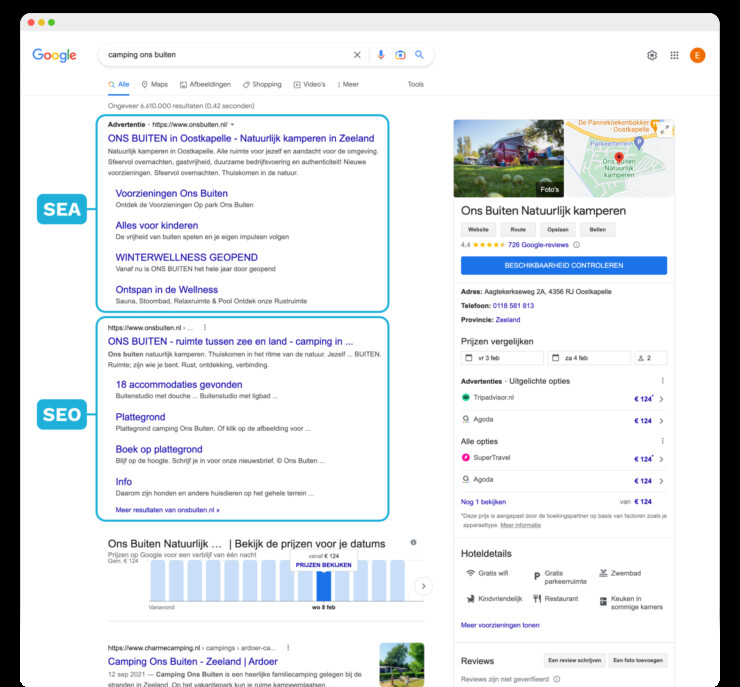Make your business more visible online with SEO
As an entrepreneur in the recreation sector, it’s crucial that your campsite, holiday park, or hotel is easily found by (potential) guests. A strong online presence is often the key to success, which means ensuring that your website ranks well in search engines like Google. This process is called SEO (Search Engine Optimization). In this blog, we’ll explain how to leverage SEO to its fullest potential for your business.
What Is SEO and why is it important?
SEO is the process of optimizing your website so that search engines rank it higher in their search results. For example, when people search for "campsite near Utrecht" or "romantic hotel in nature," you want your business to appear on the first page of Google. This is crucial because most people don’t click beyond the first few search results. The better your SEO, the higher the chance that potential guests will find you.
1. Keyword Research: the foundation of SEO
Keyword research remains the cornerstone of SEO. These are the terms people type into the search bar. For the recreation sector, it’s essential to use a mix of location-based and service-focused keywords, such as “family-friendly campsite in Limburg” or “romantic hotel in nature.”
Practical Tips for Keyword Research:
- Understand your audience: First and foremost, it’s important to have a clear picture of your target audience. What are they searching for, and how does your offering align with their needs? Based on this, you can brainstorm relevant keywords.
- Leverage AI tools: Tools like ChatGPT can help generate keyword ideas or find synonyms for your keywords.
- Focus on long-tail keywords: These are longer, more specific search phrases with less competition, such as “campsite with safari tents near Rotterdam.”
- Analyze competitors’ keywords: Tools like Ahrefs or SEMrushcan help identify the keywords your competitors use. You can also simply check their websites or Google results for insights.
Optional: take your keyword research to the next Level
If you want to elevate your keyword research, use tools like Google Keyword Planner, Ahrefs or SEMrush.. These tools provide valuable insights, such as:
- Search volume per keyword
- Keyword competition
- Alternative keyword suggestions
Would you like a comprehensive and professional keyword research report to help you start writing content based on a list of relevant keywords? Let one of Recranet’s marketing specialists ts conduct an SEO analysis for you.
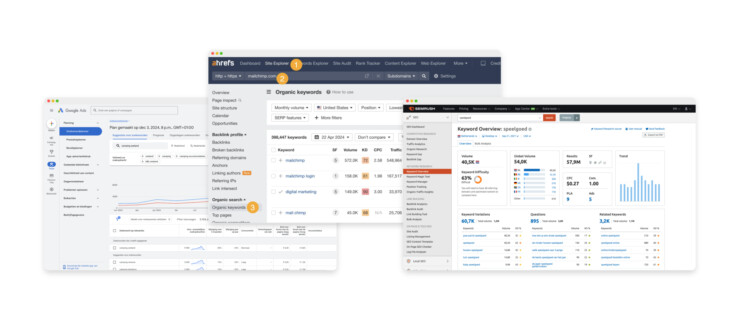
2. On-page SEO: optimise your website
On-page SEO means optimising the content and structure of your website for search engines. You do this by including important keywords in the right places in the text, such as in the title, headings and text itself.
With the rise of AI-driven search engines, it is important to focus more on the intent behind the search query. AI increasingly understands the purpose of search, so it is more important than ever to provide content that matches search intent.
Practical Tips for On-Page SEO:
- Use clear titles and meta descriptions: Ensure your title and meta description include the most important keywords. This helps search engines understand the topic of your page.
- Incorporate keywords naturally: Place keywords logically in your headings (H1, H2) and throughout your content, prioritizing key terms towards the beginning. However, avoid over-optimization, which can backfire. Beware of keyword stuffing: This outdated SEO technique involves overusing a specific keyword in your text to rank higher in search results. While tempting, this approach is discouraged because it reduces readability and is flagged as spam by search engines like Google. This could even lower your website’s ranking.
- Optimize images:Use descriptive file names and alt text for your images, such as “camping-amsterdam-forest.jpg.”
- Embed relevant videos: Add embedded videos to your site when appropriate. Videos can keep visitors on your site longer, improving engagement metrics.
- Focus on one topic per page:
To create an SEO-optimized page, concentrate on a single topic per page. Ensure your keywords for that topic are present in all key areas. For more guidance, check out our blog on creating a strong landing page.
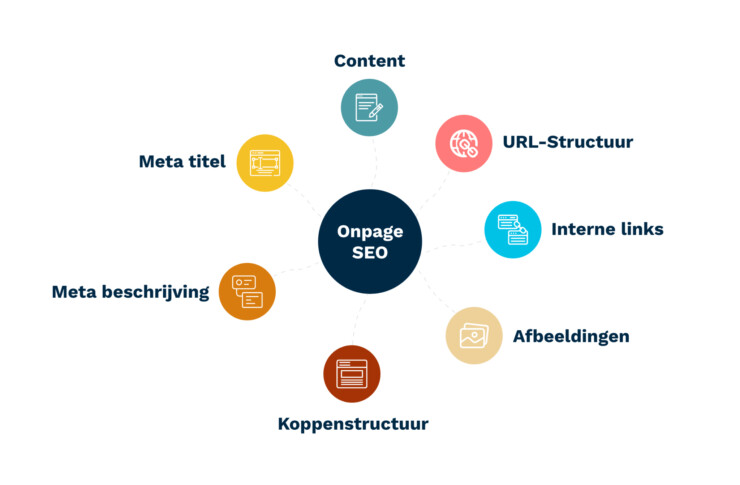
3. Content: write valuable and relevant content
It’s not only important to include keywords on your website but also to provide valuable content. Search engines value content that is relevant to the user's query.
Practical tips for content marketing:
- Publish blog posts regularly, such as articles about local attractions, activities, and events in the area where your business is located. This can help target local keywords.
- AI tools like ChatGPT can assist in generating content ideas.
- Write detailed guides or how-to articles that help users plan their vacation, such as “10 tips for a successful camping holiday in Zeeland.”
- Keep E-E-A-T (Experience, Expertise, Authoritativeness, Trustworthiness) in mind: Google prefers content that demonstrates expertise, shares real experiences, and is trustworthy. Read here more about how to write with E-E-A-T.
- Make sure to include guest reviews in your content. This increases your website’s credibility and can also improve your SEO.
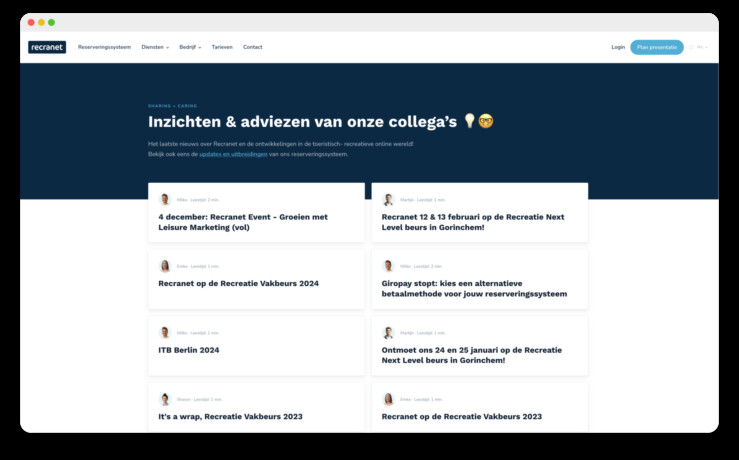
4. Linkbuilding: build authority
Linkbuilding remains essential for SEO. The more quality links other websites have pointing to your site, the higher you will rank in search results. In addition to links from other pages, it’s also valuable to have a strong internal link structure. This not only improves the user experience but also helps search engines better understand your website.
Practical tips for linkbuilding:
- Create an internal link structure. For guidance on setting up a good internal link structure, read our blog on Internal Link Structure.
- Collaborate with local businesses, bloggers, and influencers and ask them to link to your website (affiliate marketing).
- Write guest blogs on other websites or articles for tourism websites, generating valuable backlinks.
- Add your business to local directories and platforms like TripAdvisor.
5. Mobile-friendly and technical SEO: ensure a good user experience
It’s crucial that your website is mobile-friendly, as more and more people use their smartphones to search for information online. Imagine this: potential customers are sitting on the couch in the evening and see an attractive ad on social media. When they click through, they expect a website that loads quickly and works perfectly on their mobile. A poor mobile experience can cause you to lose that customer immediately.
In addition to a good mobile experience, technical SEO is essential. It ensures that search engines can efficiently index your website and that visitors have a smooth experience. This includes fast loading times, a clear structure, and user-friendly navigation. Your web developer can play a key role in optimizing the technical side of your website, helping you perform better with both visitors and search engines.
Practical tips for technical SEO:
- Make sure your website is responsive, meaning it works well on both desktop and mobile devices.
- Optimize your website’s loading speed. Use tools like Google PageSpeed Insights to test your speed and implement improvements.
- Ensure your website is secure.
- Maintain a clean URL structure so search engines can easily crawl your pages.
6. Local SEO: visibility in your region
For campsites, hotels, and holiday parks, local SEO is essential. Many of your customers will search for accommodations in a specific area, so you want to ensure you're visible in local search results.
Practical tips for local SEO:
- Claim and optimize your Google My Business profile. Google My Business is a free tool to make your business visible in local search results and on Google Maps. This ensures your business appears in Google Maps and local search results. For guidance on setting up your Google My Business profile, read our blog on how to create an effective Google My Business profile for better local visibility.
- Collect customer reviews on Google and other platforms like Trustpilot. Positive reviews help improve your ranking in local search results.
- Ensure you have locally relevant backlinks, such as from tourism websites or local businesses.
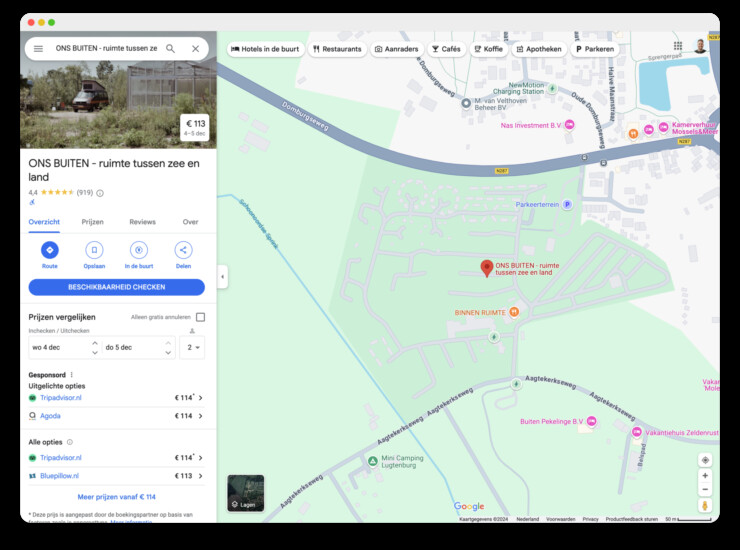
SEA: Advertising in search engines as a complement to SEO
In addition to SEO, you can also enhance your online visibility with SEA (Search Engine Advertising). SEA involves paid ads in search engines like Google. This allows you to target potential guests actively searching for what you offer, effectively promoting your campsite, hotel, or holiday park. It can be a highly effective complement to SEO, as you appear directly above the organic search results.
Why SEA?
- Immediate results: You appear at the top of search results right away, without waiting for organic growth.
- Targeted advertising: Reach specific audiences with keywords, location targeting, and timing.
- Measurable results: Enhanced ecommerce tracking provides detailed insights into customer behavior, such as which products are viewed, added to carts, and purchased. This valuable data allows you to optimize campaigns precisely and significantly increase your ROI. This is an essential part of the comprehensive marketing solutions we provide for our clients.
We hope our tips are helpful. Want to take it a step further and have professionals handle it for you? Our marketers are ready to set up and optimize your campaigns. This way, you can focus on your guests while we take care of your visibility and growth.
